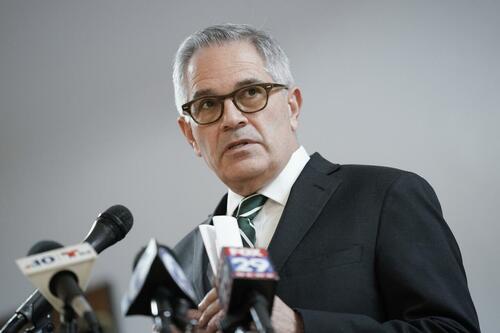
Authored by Tom Hogan via RealClear Pennsylvania,
Whether it is Russia trying to hide the people who disappeared into the gulags, China ignoring the dissidents erased in the Cultural Revolution, or the Khmer Rouge pretending that the Cambodian genocide never happened, a leader trying to rewrite history is seldom a good idea. Now Philadelphia District Attorney Larry Krasner is attempting this dubious feat, erasing four homicides from the city’s history as if the victims were never killed.

On a spring day in 2009, defendants Donta Craddock and Ivan Rodriguez were out cruising on the streets of Philadelphia in a Pontiac Grand Prix. The two decided to steal a motorcycle at gunpoint, a felony. Rodriguez drove off on the stolen motorcycle. Craddock took off in the Grand Prix, almost instantly pursued by Philadelphia police who were alerted by a witness. Fleeing from the lights and sirens of the police, Craddock rammed into a crowd on the sidewalk in North Philadelphia, killing four people: Aaliyah Griffin, 6; Gina Marie Rosario, 7; Latoya Smith, 22; and her daughter, not even one-year-old Rimanee. The scene was horrific, with the children splattered over the street and neighbors weeping. The victims were black and Latino.
The Philadelphia Police Department and District Attorney’s Office did not hesitate. Craddock and Rodriguez were charged with second-degree murder because the killings of the innocent victims took place during the course of a felony – the robbery of the motorcycle. Also known as felony murder, this crime category has existed under the law for longer than the United States has existed as a country. If five guys rob a bank and one kills a security guard during the robbery, all five defendants are charged with felony murder because their unlawful conduct resulted in the death. Second-degree murder carries a mandatory sentence of life imprisonment in Pennsylvania.
Assistant District Attorney Jude Conroy, an experienced homicide prosecutor, led the case against Rodriguez and Craddock. Jurors and witnesses cried during the trial as they heard about the children who were killed. The defendants were convicted of second-degree murder and sentenced to life imprisonment. The defendants appealed, but the courts upheld the convictions.
The victims’ families found some solace in the convictions. Janice Brown, the mother of Latoya Smith and grandmother of Rimanee Smith, said, “Justice has been served.” Aaliyah Griffin’s mother remained devastated: “It’s still hard. That’s my first daughter – she’s the one that made me a mom. She’s my best friend and they took it away from me. I’ll never get to see her with kids; I won’t see her in college; I won’t see her get married.”
Unfortunately for the families of these murder victims, Larry Krasner was elected district attorney of Philadelphia in 2017. And Krasner does not like the doctrine of second-degree murder. Under his leadership, as new murders were committed, the Philadelphia District Attorney’s Office has been reducing cases from first- or second-degree murder to third-degree murder or manslaughter, vastly cutting the amount of time these defendants will spend in jail. And Krasner has had plenty of opportunities to go light on murderers, since Philadelphia set a new all-time record for homicides in 2021, with 562 killings. Other prosecutors, including former Philadelphia district attorney and Pennsylvania governor Ed Rendell, have been sharply critical of Krasner for his practice of downgrading homicides.
Still, while future homicides might be punished less severely in Philadelphia, the families of murder victims from prior years, before Krasner became district attorney, assumed that they would be safe from Krasner’s light touch on killers. They were wrong – as the families of the victims murdered by Craddock and Rodriguez recently found out.
Krasner recently decided to let Rodriguez walk out of prison. He switched the murder conviction to a guilty plea to robbery and agreed to a sentence of 10–20 years, allowing Rodriguez to go free based on the amount of time he already has served. The conviction was not reversed on appeal. No new evidence was introduced. According to Krasner’s spokesperson, the deal was cut simply because Krasner believes that the mandatory life sentence for second-degree murder is excessive, an “extreme punishment,” as Krasner’s press office puts it.
Tammy Torres, whose seven-year-old daughter was killed in the crime, lashed out at Krasner. “I’m not sure how the DA came to the conclusion that this murderer should walk free,” she said. “[Rodriguez] was what started this series of events, this whole nightmare.” Neatly summarizing the concept of felony murder, Torres explained: “Had he and his codefendant not decided to steal that motorcycle, none of this would have happened. He is just as guilty as the person driving the car that murdered three children and one mother.”
In deciding to wipe out the murder conviction for Rodriguez, Krasner is effectively erasing certain people from history: the legislature of Pennsylvania, which duly enacted the law of second-degree murder; the police officers who worked on the investigation; the prosecutor, Jude Conroy, who worked so hard for the conviction and remains a prosecutor in the district attorney’s office; the trial judge who oversaw the proceedings and the appellate judges who upheld the convictions; the jury, who considered the facts and the law in reaching a just verdict. And most importantly, Krasner is erasing the victims and their families, pretending that four people were not killed through the conduct of this criminal.
Who weeps for the victims of crimes? Their mothers, fathers, grandparents, brothers, sisters, and friends. But not Larry Krasner. He weeps only for criminals.
Authored by Tom Hogan via RealClear Pennsylvania,
Whether it is Russia trying to hide the people who disappeared into the gulags, China ignoring the dissidents erased in the Cultural Revolution, or the Khmer Rouge pretending that the Cambodian genocide never happened, a leader trying to rewrite history is seldom a good idea. Now Philadelphia District Attorney Larry Krasner is attempting this dubious feat, erasing four homicides from the city’s history as if the victims were never killed.

On a spring day in 2009, defendants Donta Craddock and Ivan Rodriguez were out cruising on the streets of Philadelphia in a Pontiac Grand Prix. The two decided to steal a motorcycle at gunpoint, a felony. Rodriguez drove off on the stolen motorcycle. Craddock took off in the Grand Prix, almost instantly pursued by Philadelphia police who were alerted by a witness. Fleeing from the lights and sirens of the police, Craddock rammed into a crowd on the sidewalk in North Philadelphia, killing four people: Aaliyah Griffin, 6; Gina Marie Rosario, 7; Latoya Smith, 22; and her daughter, not even one-year-old Rimanee. The scene was horrific, with the children splattered over the street and neighbors weeping. The victims were black and Latino.
The Philadelphia Police Department and District Attorney’s Office did not hesitate. Craddock and Rodriguez were charged with second-degree murder because the killings of the innocent victims took place during the course of a felony – the robbery of the motorcycle. Also known as felony murder, this crime category has existed under the law for longer than the United States has existed as a country. If five guys rob a bank and one kills a security guard during the robbery, all five defendants are charged with felony murder because their unlawful conduct resulted in the death. Second-degree murder carries a mandatory sentence of life imprisonment in Pennsylvania.
Assistant District Attorney Jude Conroy, an experienced homicide prosecutor, led the case against Rodriguez and Craddock. Jurors and witnesses cried during the trial as they heard about the children who were killed. The defendants were convicted of second-degree murder and sentenced to life imprisonment. The defendants appealed, but the courts upheld the convictions.
The victims’ families found some solace in the convictions. Janice Brown, the mother of Latoya Smith and grandmother of Rimanee Smith, said, “Justice has been served.” Aaliyah Griffin’s mother remained devastated: “It’s still hard. That’s my first daughter – she’s the one that made me a mom. She’s my best friend and they took it away from me. I’ll never get to see her with kids; I won’t see her in college; I won’t see her get married.”
Unfortunately for the families of these murder victims, Larry Krasner was elected district attorney of Philadelphia in 2017. And Krasner does not like the doctrine of second-degree murder. Under his leadership, as new murders were committed, the Philadelphia District Attorney’s Office has been reducing cases from first- or second-degree murder to third-degree murder or manslaughter, vastly cutting the amount of time these defendants will spend in jail. And Krasner has had plenty of opportunities to go light on murderers, since Philadelphia set a new all-time record for homicides in 2021, with 562 killings. Other prosecutors, including former Philadelphia district attorney and Pennsylvania governor Ed Rendell, have been sharply critical of Krasner for his practice of downgrading homicides.
Still, while future homicides might be punished less severely in Philadelphia, the families of murder victims from prior years, before Krasner became district attorney, assumed that they would be safe from Krasner’s light touch on killers. They were wrong – as the families of the victims murdered by Craddock and Rodriguez recently found out.
Krasner recently decided to let Rodriguez walk out of prison. He switched the murder conviction to a guilty plea to robbery and agreed to a sentence of 10–20 years, allowing Rodriguez to go free based on the amount of time he already has served. The conviction was not reversed on appeal. No new evidence was introduced. According to Krasner’s spokesperson, the deal was cut simply because Krasner believes that the mandatory life sentence for second-degree murder is excessive, an “extreme punishment,” as Krasner’s press office puts it.
Tammy Torres, whose seven-year-old daughter was killed in the crime, lashed out at Krasner. “I’m not sure how the DA came to the conclusion that this murderer should walk free,” she said. “[Rodriguez] was what started this series of events, this whole nightmare.” Neatly summarizing the concept of felony murder, Torres explained: “Had he and his codefendant not decided to steal that motorcycle, none of this would have happened. He is just as guilty as the person driving the car that murdered three children and one mother.”
In deciding to wipe out the murder conviction for Rodriguez, Krasner is effectively erasing certain people from history: the legislature of Pennsylvania, which duly enacted the law of second-degree murder; the police officers who worked on the investigation; the prosecutor, Jude Conroy, who worked so hard for the conviction and remains a prosecutor in the district attorney’s office; the trial judge who oversaw the proceedings and the appellate judges who upheld the convictions; the jury, who considered the facts and the law in reaching a just verdict. And most importantly, Krasner is erasing the victims and their families, pretending that four people were not killed through the conduct of this criminal.
Who weeps for the victims of crimes? Their mothers, fathers, grandparents, brothers, sisters, and friends. But not Larry Krasner. He weeps only for criminals.







